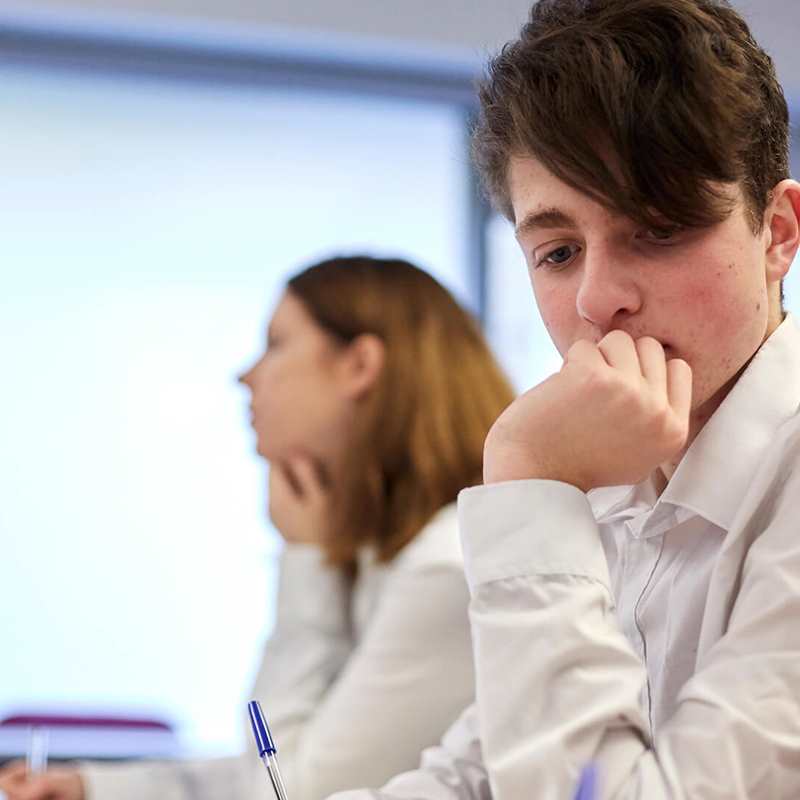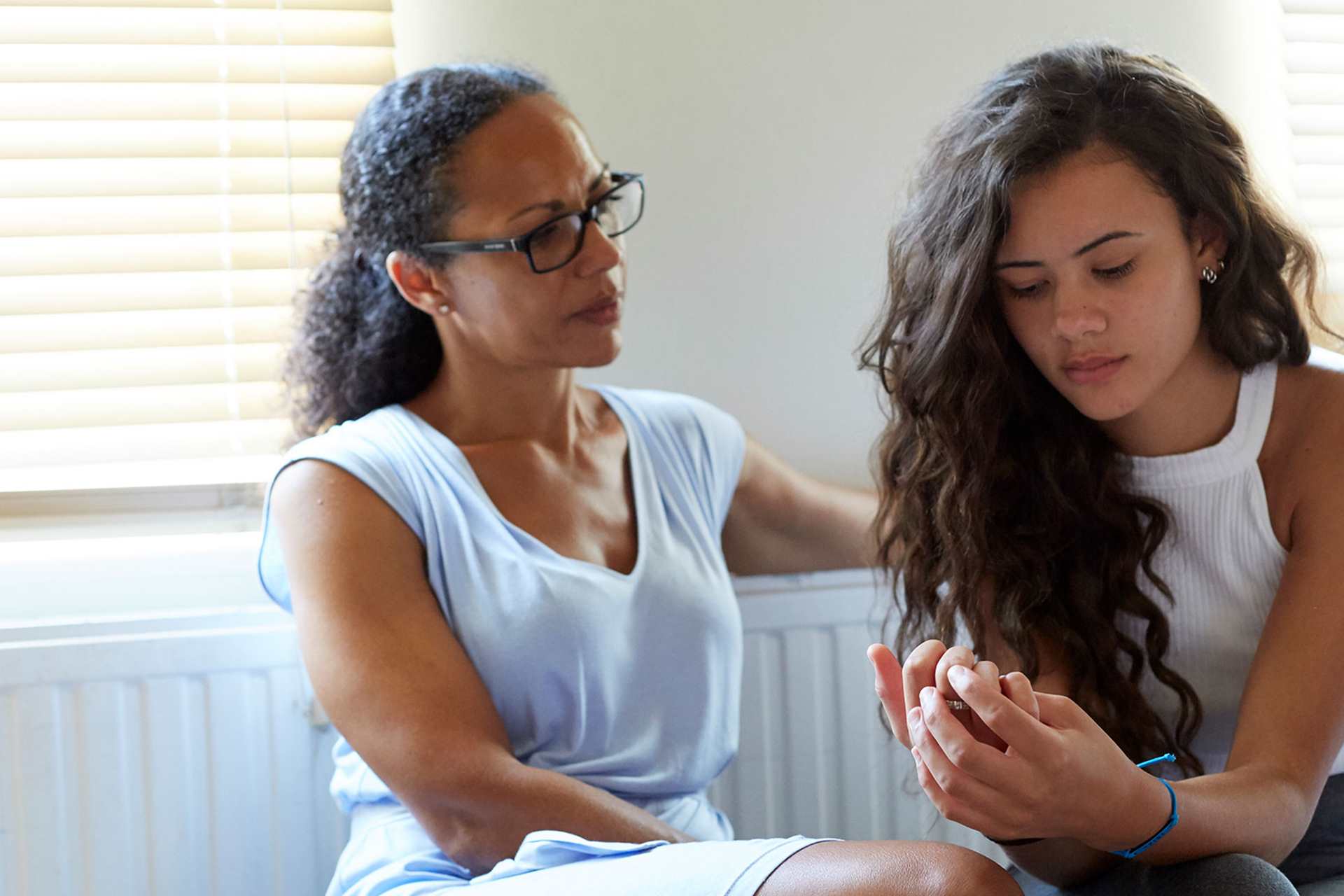Topics: exam stress, Missing the Mark campaign
-
YoungMinds finds 15% of young people struggling to cope with exams stopped going to school and 13% had suicidal thoughts.
-
Additional research conducted by YoungMinds and More Than A Score finds 10-11-year-olds didn’t sleep well and lost confidence, because of SATs.
-
YoungMinds is calling for a major overhaul of the exam system with an end to SATs and a huge shift in how young people are assessed for GCSEs and A Levels.
New research, from mental health charity YoungMinds, reveals the physical and mental harm high pressure exams are causing children and young people sitting SATs, GCSEs and A Levels this summer, at a time when more young people than ever before are struggling with their mental health.
Exam stress is one of many factors contributing to the record numbers of young people referred by the NHS for mental health support. This new research highlights how the current exam system is pushing young people to their limits and exacerbating poor mental health.
The findings show 63% of 15-18-year-olds said they struggled to cope in the lead up to and during GCSE and A Level exams. Of these:
Of the 15% who stopped going to school, 37% were absent for more than 15 days. Among those struggling to cope, 61% experienced anxiety and 40% worsening mental health, while 30% skipped meals and 1 in 4 (26%) had panic attacks.
Exams (55%) and academic pressure (40%) are the factors most likely to have a significant negative impact on their mental health for 15-18-year-olds, with exams more than twice as likely to cause this than social media (24%). Loneliness (35%), friendships (33%) and family relationships (30%) were also highlighted as negatively impacting on their mental health.
Children harmed by SATs
Children who sat their year six SATs this summer reported similar physical and mental harm because of exams. The research conducted with 10-11-year-olds, in collaboration with More Than A Score, found SATs negatively impacted confidence with over half (56%) of children saying doing SATs was the first time they really worried about their abilities. Over a quarter (28%) of 10-11-year-olds said SATs made them feel bad about themselves and 35% said SATs made them feel ill.
Like the older age group, children sitting SATs also experienced problems with sleep and eating, with 71% feeling worried before they took their exams. Of these:
- 38% didn’t sleep well
- 20% didn’t want to go to school
- 20% had headaches
- 14% worried about getting a job because of doing badly in SATs
- 19% had tummy aches
- 10% didn’t eat properly

Change to exam system
Young people, whether taking SATs, GCSEs or A Levels, overwhelmingly want change to the exam system. 69% of 10-11-year-olds said having no SATs would make them feel less stressed, while 74% of 15-18-year-olds think exams should be reformed to improve mental health.
YoungMinds’ Missing the Mark campaign is calling on the Government to end SATs in primary school and reduce the focus on end of two-year exams for GCSEs and A Levels by introducing different types of assessment tailored to subject need. Today, (17th June) as part of the campaign, a group of young people from YoungMinds will be at Parliament talking to MPs about the impact exams are having on them and their mental health.
Paddy, 20, a YoungMinds Activist backing the campaign, said taking his A Levels was like ‘drowning in the sea of pressure.’
From the start of year 13, I found it difficult to think about anything other than exams. At school I would hardly eat anything as I was so focused on studying. The exams massively heightened my OCD. It seemed to know these exams were incredibly important to me, and it went on the attack.
“The peak was the night before one exam, when I had a complete breakdown and could not stop crying. The pressure was enormous, and I felt like I was drowning in the sea of pressure. Two years after finishing my exams, I still have nightmares about them, imagining I am back in the exam hall.
This research exposes the harm caused by exams at all ages. There is a youth mental health emergency and people are in distress. It’s heartbreaking an education system which should be designed to support them and help them thrive is leading to many struggling with suicidal thoughts and self-harm. The message from young people is clear, the current education system, with a singular focus on end of year exams, is not working.
From a young age, the education system is structured in a way that teaches children their worth is tied to achieving in exams. As a result, young people are tested on a narrow set of skills which fails to prepare them for life after school and leaves them with worse mental health after years of academic pressure.
We need to reduce the pressure school places on young people. YoungMinds’ Missing the Mark campaign is urging the Government to listen to young people and transform how they are assessed so that we better prepare them for the world after education. This means ending SATs and introducing different types of assessment for GCSE and A Levels, instead of placing the burden on end of year, high pressure exams. Ultimately, young people deserve an education fit for the 21st century, where mental health and academic achievement are not at odds with one another.
We are pleased to see Young Minds raising this important issue. Across the country, 10 and 11-year-olds and their families have been negatively affected by the unnecessary pressure of year six SATs. This system damages many children's self-esteem and can impact their mental health. It's time for an assessment system that celebrates children's successes and doesn't brand them as failures so early in their education.
About YoungMinds
YoungMinds is the UK’s leading charity fighting for young people’s mental health.
Follow us on Twitter @YoungMindsUK and Facebook.
For free advice and support for parents, call our Parents Helpline on 0808 802 5544.
About More Than A Score
More Than A Score is a coalition of over 50,000 parents, teachers, school leaders and education experts campaigning for substantial reform to the primary assessment system.
For further information and for interview requests please contact press@youngminds.org.uk or call 0203 861 2072.
Methodology
Savanta interviewed 1,040 15–18-year-olds taking GCSE or A-Levels this summer and 534 10–11-year-olds taking year six SATS this term, online, between 21-30 May 2025.



